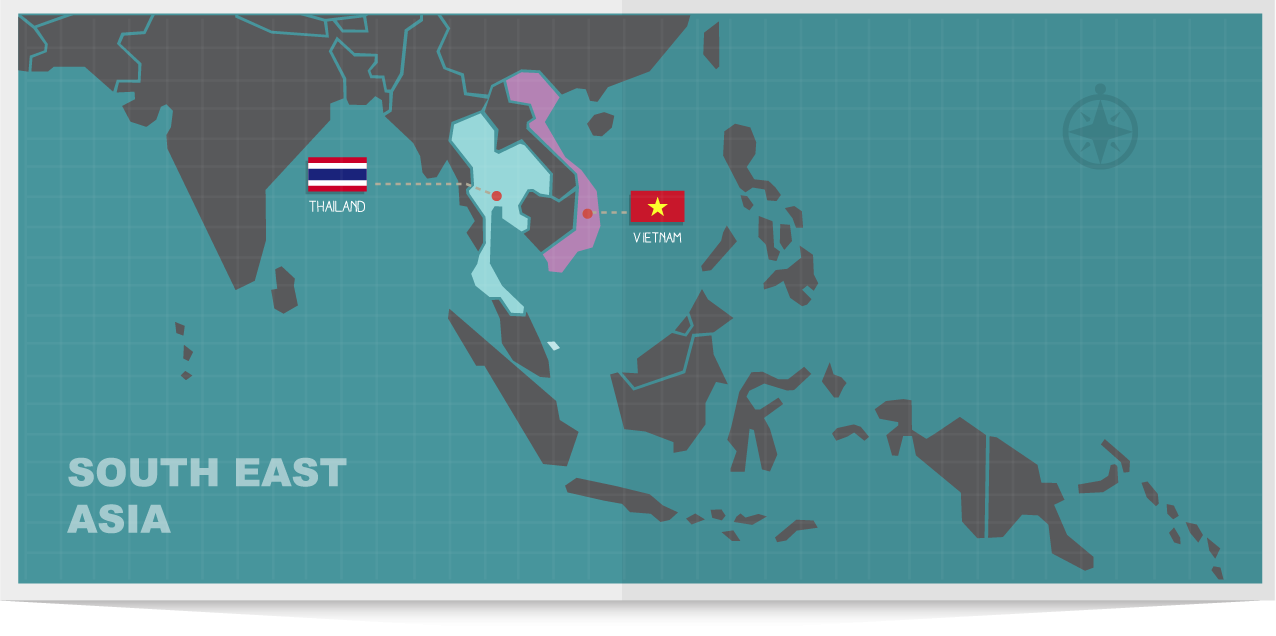Why Vietnam is Overtaking Thailand as Southeast Asia's Top Digital Nomad Destination

After three years of full-time travel through Southeast Asia, I've watched Thailand's grip on the digital nomad community slowly loosen while Vietnam quietly emerges as the region's most compelling destination for nomadic families. Having just spent six months in Da Nang, we can tell you firsthand: the shift is real, and it's accelerating.
Thailand's restrictive visa policies, ever-changing border run crackdowns, and skyrocketing costs are pushing nomads toward Vietnam's welcoming arms. For worldschooling families like ours, the numbers tell a compelling story that goes far beyond simple cost savings.
The Great Southeast Asian Nomad Migration
Let's be honest about what's happening here. Thailand has been the Southeast Asian digital nomad king for over a decade, but recent policy changes and market dynamics are creating what feels like a perfect storm pushing families toward Vietnam.
We've witnessed this migration firsthand during our extended stays in both countries. The nomad communities in Chiang Mai and Bangkok are increasingly dominated by short-term tourists rather than families building longer-term lives. Meanwhile, Da Nang has exploded with worldschooling families who've discovered they can live better for less money.
The data backs up what we're seeing on the ground:
- Da Nang experienced 109% growth in digital nomad population in 2023
- Vietnam achieved 98% recovery of pre-pandemic tourism levels
- Thailand's new visa policies exclude many nomad families from long-term stays
But this isn't just about numbers. It's about fundamental changes in how nomad families evaluate destinations and what we're willing to trade for financial freedom.
Thailand's New Rules: Better or Just More Expensive?
Thailand's Destination Thailand Visa (DTV) launched in July 2024 with great fanfare, promising to revolutionize the country's approach to digital nomads. On paper, it looks impressive: five years, multiple entries, and family inclusion. In practice? It's created more barriers than bridges for most nomad families.
The DTV Reality Check
Here's what Thailand is actually asking for:
| Requirement | Cost/Complexity |
|---|---|
| Bank statements | ฿500,000 ($14,870) for 3 months |
| Application fee | $280 per person |
| Application location | Must apply from home country |
| Stay limitations | 180 days max, then exit or extend |
| Family inclusion | Yes, but primary applicant needs full funds |
The kicker? You have to apply from your home country or country of employment. So much for the nomad lifestyle of spontaneous movement and border flexibility.
Then there's the tax situation.
Starting January 1, 2024, Thailand began taxing all foreign income brought into the country by residents staying 180+ days annually. This isn't just a minor policy tweak - it's a fundamental shift that affects how nomad families manage their finances and residency planning.
For families like ours earning from international clients while based in Thailand, this creates a complex web of tax obligations and reporting requirements that many nomads simply aren't equipped to handle.
Border Run Crackdowns Get Real
Thailand's immigration enforcement has intensified significantly over the past year. The days of indefinite tourist visa runs are essentially over, and immigration officers are increasingly scrutinizing nomads attempting to establish de facto residence through visa runs.
We've spoken with multiple families who've been questioned, denied entry, or forced to show significant financial reserves at borders. The uncertainty alone is driving many nomads to seek alternatives with clearer long-term policies.
Vietnam's Winning Strategy: Keep It Simple
Vietnam's approach to digital nomads couldn't be more different from Thailand's complexity. While Thailand builds barriers, Vietnam removes them systematically.
E-Visa Simplicity That Actually Works
Vietnam's e-visa system represents everything Thailand's DTV isn't: simple, affordable, and accessible. Here's the comparison that matters:
Vietnam E-Visa Benefits:
- Cost: $25-50 for 90 days
- Processing: 3-5 working days online
- Application: From anywhere in the world
- Family-friendly: Individual visas spread costs
- Renewal: Unlimited entries during validity period
The visa exemption program has expanded to include 45-day visa-free stays for citizens from twelve countries, including major European nations. More importantly, Vietnam removed the previous 30-day waiting period between visits, allowing genuine border runs without complex planning.
The Golden Visa Promise
Vietnam's proposed "Golden Visa" program could be a game-changer if implemented as outlined. The program would offer:
- 10-year visas for investors
- 5-year talent visas for skilled professionals
- Simplified renewal processes
- Lower financial barriers than Thailand's current system
While details remain under government review, the program signals Vietnam's commitment to attracting long-term foreign residents rather than just extracting maximum short-term revenue.
The Numbers Don't Lie: Vietnam Costs Way Less
After six months in Da Nang and multiple extended stays in Thailand, we can provide real-world cost comparisons that matter to nomad families. The savings aren't marginal - they're transformational.
Our Real Family Costs
Living in Da Nang with three kids versus our previous Chiang Mai experience - here's the actual breakdown:
| Expense Category | Da Nang, Vietnam | Chiang Mai, Thailand | Difference |
|---|---|---|---|
| Accommodation | $880 | $610 | +$270 |
| 2BR beach view apt | 2BR apartment | (beach views!) | |
| Water | Included | $12 | -$12 |
| Electricity | $104 | $255 | -$151 |
| (AC nights only) | (AC nights only) | (2.5x cheaper!) | |
| Groceries | $200 | $300-400 | -$100-200 |
| Laundry Service | $20 | $40-60 | -$20-40 |
| Part-time Nanny | $240/month | Not available | Priceless |
| (2 days/week) | |||
| Transportation | $80 | $120-200 | -$40-120 |
| Total Housing | $984 | $877 | +$107 |
| Quality of Life | Beach views + nanny | Larger house | Vietnam wins |
Despite paying slightly more for housing in Vietnam, we got a beach view apartment plus affordable childcare that's impossible to find in Thailand. The electricity savings alone ($151/month) nearly offset the accommodation difference, while grocery and service savings add up to significant monthly benefits.
The part-time nanny deserves special mention. At 1.5 million dong ($60) per week for two days, this service would cost $200-300 weekly in Thailand - if you could find it at all. For worldschooling families needing occasional childcare for meetings or exploration, this represents a massive quality-of-life improvement.
Education: The Biggest Difference Maker
For worldschooling families considering traditional schooling options, the education cost difference between Vietnam and Thailand is staggering:
| School Type | Vietnam Annual Cost | Thailand Annual Cost | Annual Savings |
|---|---|---|---|
| Premium International | $15,000-25,000 | $25,000-35,000 | $10,000+ |
| Mid-Range International | $10,000-18,000 | $15,000-25,000 | $5,000-7,000 |
| Local International | $5,000-12,000 | $8,000-15,000 | $3,000-5,000 |
For families with multiple children, these savings compound dramatically. A family with two kids could save $20,000+ annually on education alone while maintaining comparable academic quality and accreditation standards.
The Budget Breakdown Reality
Here's what comfortable family living actually costs:
Da Nang (Vietnam) - Monthly Family Budget:
- Accommodation: $880 (including water)
- Electricity: $104 (AC nights only)
- Food/Groceries: $200-300
- Transportation: $80-120
- Entertainment/Activities: $150-250
- Healthcare: $50-100
- Miscellaneous: $150-250
- Total: $1,614-2,004
Chiang Mai (Thailand) - Monthly Family Budget:
- Accommodation: $610
- Utilities (water/electric): $267
- Food/Groceries: $250-400
- Transportation: $100-180
- Entertainment/Activities: $200-350
- Healthcare: $80-150
- Miscellaneous: $200-350
- Total: $1,707-2,307
The difference represents 21-25% savings for comparable lifestyles, but the real advantage comes from Vietnam's superior service accessibility at these lower price points.
Infrastructure: Close Enough for Most Nomads
Let's address the elephant in the room: is Vietnam's infrastructure adequate for serious remote work? After six months of daily Zoom calls, video editing, and running our YouTube channel from Da Nang, the answer is a qualified yes.
Internet Reality Check
Da Nang Internet Performance:
- Average speed: 40-50 Mbps (honestly felt faster and more reliable than Chiang Mai)
- Reliability: 95%+ uptime with backup generators in every building
- Cost: $10-15 monthly for home fiber
- Mobile data: Unlimited plans around $3 monthly
- Power backup: Every apartment/hotel has generators (we only lost power twice in 6 months)
Compare this to Thailand's premium speeds (Bangkok averages 121 Mbps) but higher costs ($6-45 monthly for mobile plans). The real advantage? Vietnam's infrastructure assumes power issues and plans accordingly. When the lights go out (rarely), the internet stays on thanks to ubiquitous backup power systems.
Coworking Scene Evolution
Vietnam's coworking spaces have evolved rapidly. Da Nang now offers:
- Modern facilities with ocean views and premium amenities
- Monthly rates $38-96 vs Thailand's $90-210
- Growing nomad communities with regular networking events
- Family-friendly options with childcare areas
The spaces aren't as polished as Bangkok's premium facilities, but they're perfectly functional and cost 50-60% less.
Banking and Business
Here's where Vietnam really surprised us. Both countries support major digital banking platforms (Wise, Revolut) and allow nomads to get local phone numbers (essential for app signups and loyalty programs). But Vietnam goes further: we could actually open a local bank account.
This changes everything. After getting our Vietnamese bank account, we rarely needed ATMs or cash thanks to the incredibly convenient QR code payment system. Point your phone at a QR code, payment's done. It works everywhere from street food vendors to luxury hotels.
Thailand's banking remains more restrictive for short-term residents, forcing continued reliance on international cards and higher transaction fees. Vietnam's financial inclusion for temporary residents represents a genuine quality-of-life improvement that saves money and eliminates daily friction.
The Community Aspect: Vietnam's Authenticity Edge
One unexpected advantage we discovered in Vietnam is the nomad community's different character. Thailand's established nomad hubs increasingly feel commercialized and tourist-focused, while Vietnam attracts nomads seeking more authentic cultural experiences.
The Worldschool Difference
Worldschooling families in Vietnam tend to be more intentional about cultural immersion and language learning. The lower costs enable longer stays, deeper community connections, and more meaningful educational experiences for children.
However, we need to address something that mortified us during our stay: the entitled behavior of some nomad families at local establishments. We witnessed families bringing their own food and coolers to local cafes, using the WiFi and space without purchasing anything, and asking staff for cutlery and ice. This behavior embarrasses the entire nomad community and damages relationships with local businesses.
Support local businesses, purchase food and drinks when using spaces, and teach your children to respect local customs. We always bring our girls' water bottles to beach cafes, but we're simultaneously ordering smoothies, french fries, and beers to support the business.
Vietnam doesn't have a tipping culture, so don't worry about that complexity - just spend money on the actual services and show respect for local customs.
Cultural Learning Opportunities
Vietnam's educational value for children extends far beyond formal schooling. The country's complex history, rapidly developing economy, and authentic cultural practices provide worldschooling families with incredible learning laboratories.
Our daughters learned more about resilience, entrepreneurship, and cultural adaptation during six months in Vietnam than in years of traditional educational settings. The country rewards curiosity and provides safe spaces for children to explore independently while maintaining family-friendly community standards.
Looking Forward: The Trend Seems Irreversible
Based on our extensive experience in both countries and conversations with dozens of nomad families, Vietnam's ascendance appears sustainable and accelerating.
Thailand's Premium Positioning
Thailand will likely maintain appeal for nomads requiring:
- Premium infrastructure and established expat services
- Sophisticated legal frameworks for business establishment
- Luxury lifestyle options and high-end amenities
- English-language everything without adaptation requirements
Vietnam's Value Proposition
Vietnam increasingly captures families prioritizing:
- Maximum financial efficiency and cost optimization
- Authentic cultural experiences for children
- Emerging market opportunities for entrepreneurs
- Adventure over convenience in daily living
The Practical Bottom Line
For most worldschooling families, Vietnam offers the optimal balance of cost, quality, and cultural richness that defines successful nomadic lifestyles. Annual savings of $5,000-15,000 aren't just budget optimization - they're life-changing amounts that enable extended travel, better education options, and genuine financial freedom.
The infrastructure gap continues narrowing while the cost advantages remain substantial. Unless Thailand dramatically restructures its approach to nomad families or Vietnam significantly raises its prices, this migration pattern will likely accelerate.
Our Recommendation
Having lived extensively in both countries with three young children, we recommend Vietnam for families seeking maximum value and authentic experiences, while Thailand remains superior for nomads prioritizing convenience and premium services.
Choose Vietnam if you:
- Prioritize cost savings and financial optimization
- Want authentic cultural immersion for your children
- Enjoy emerging market energy and rapid development
- Can adapt to simpler but evolving infrastructure
Choose Thailand if you:
- Need premium infrastructure and established systems
- Require sophisticated legal/business frameworks
- Prefer English-language convenience in daily life
- Can afford 25-40% higher costs for premium positioning
For us? Vietnam's combination of affordability, educational value, and adventure perfectly matches our worldschooling priorities. The money we save enables extended regional travel, better housing, and educational opportunities that wouldn't be possible at Thailand's price points.
The shift from Thailand to Vietnam represents more than cost arbitrage - it's about choosing countries that welcome nomad families rather than merely tolerating them. Vietnam's accessibility and genuine enthusiasm for long-term visitors creates better experiences for families willing to embrace emerging market realities.
Ready to plan your Vietnam adventure? Contact Lindsay at [email protected] for personalized travel planning that maximizes your family's budget and experiences.
Want to see our full experience in Vietnam? Check out our vlogs on our YouTube channel. For more nomad family insights and practical travel tips, follow us on Instagram.
Sources
- ASEAN Business News - New Digital Nomad Visa: Thailand's Plan to Boost Tourism
- Digital Nomad Asia - Vietnam Digital Nomad Visa on the Horizon
- Eurasia Business News - Why Digital Nomads love living in Da Nang, Vietnam
- U.S. Embassy Thailand - Thai Visas for Americans
- Thailand Embassy - Destination Thailand Visa Guide
- U.S. Embassy Vietnam - Vietnamese Visas and Entry/Exit
- Vietnam E-visa Portal - National Immigration Portal
- CNBC - Vietnam is the most affordable country for expats in 2024
- Numbeo - Cost of Living Comparisons: Da Nang vs Chiang Mai
- International Living - Cost of Living in Thailand Guide





